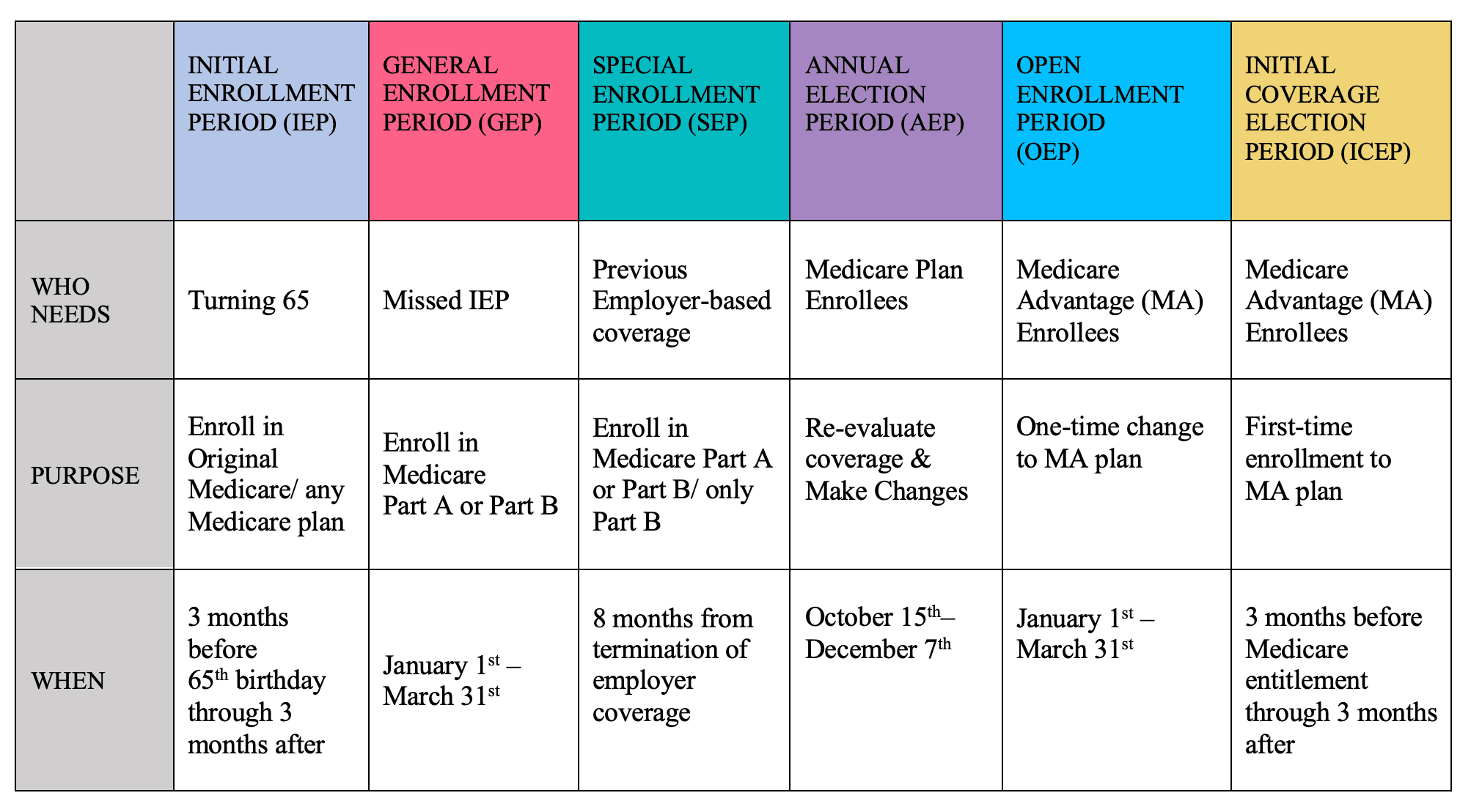Medicare Enrollment May Affect Your HSA Contribution
Stay Up to Date on Medicare!
Medicare
can impact your HSA and answer some common questions about this topic.What's an HSA?
Can I Continue to Contribute to My HSA After Enrolling In Medicare?
Medicare Part A
and Part B.Why Can't I have an HSA with Medicare?
- You must be covered under a high-deductible health plan (HDHP) on the first day of the month.
- You cannot have any other health coverage except as permitted under the rules for
other health coverage.
- You cannot be enrolled in Medicare.
- You must not be claimed as a dependent on someone else's tax return.
When Do I Need to Stop Contributing to My HSA?
- If you plan to enroll in Medicare when you turn 65 or during your Initial Enrollment Period, you must stop making HSA contributions the month before your Medicare effective date.
- If you plan to delay Medicare, you must stop making HSA contributions at least six months before your Medicare effective date. This is because enrolling in Medicare Part A comes with up to six months of retroactive coverage — but not beyond your initial month of eligibility. You may incur a tax penalty if you do not stop HSA contributions at least six months before Medicare enrollment.
Why Is There a 6-Month Lookback Period for HSA Contributions?
I Already Made Contributions That Aren’t Allowed. How Do I Fix It?
taxes
for the year you made those contributions. Otherwise, you'll have to file an amended return.What Is the Penalty for HSA Contributions Made After I Start Medicare?
Can I Use HSA Funds After I Enroll in Medicare?
qualified medical expenses
, such as deductibles, copays, and premiums forMedicare Part B
, Part D, andMedicare Advantage
. Additionally, if you continue to use the account for qualified medical expenses, the funds will remain tax-free.Medigap
) as they are not considered qualified medical expenses under IRS rules.What if I Choose to Stay on My Non-Credible HDHP at Work?
FAQs About HSA Eligibility and Regulations Relating to Spouses
Weigh Your Options Carefully
our advisors
are here to help. Give us a call at 1-888-376-2028 to discuss your options and get personalized advice.Stay Up to Date on Medicare!
Recommended Articles


















More of our articles
13 Best Ways for Seniors to Stay Active in Philadelphia
14 Best Ways for Seniors to Stay Active in Washington, D.C.
14 Best Ways to Stay Active in Charlotte
15 Best Ways for Seniors to Stay Active in Denver
2023 Medicare Annual Election Period (AEP)
2024 Medicare Price Changes
Can I Change Medicare Advantage Plans Any Time? | Medicare Plans
Can I Change My Primary Care Provider with an Advantage Plan?
Do Medicare Supplement Plans Cover Dental and Vision?
Do You Need Books on Medicare?
Does Medicare Cover Abortion Services?
Does Medicare Cover Cala Trio?
Does Medicare Cover Cervical Disc Replacement?
Does Medicare Cover Cosmetic Surgery?
Does Medicare Cover COVID Tests?
Does Medicare cover Deviated Septum Surgery?
Does Medicare Cover Flu Shots?
Does Medicare Cover Geri Chairs?
Does Medicare Cover Hoarding Cleanup?
Does Medicare Cover Home Heart Monitors?
Does Medicare Cover Inqovi?
Does Medicare Cover INR Machines?
Does Medicare Cover Ketamine Infusion for Depression?
Does Medicare Cover Kidney Stone Removal?
Does Medicare Cover Light Therapy for Psoriasis?
Does Medicare Cover Macular Degeneration?
Does Medicare Cover Mental Health?
Does Medicare Cover Nuedexta?
Does Medicare Cover Penile Implant Surgery?
Does Medicare Cover Piqray?
Does Medicare Cover Qutenza?
Does Medicare Cover Robotic Surgery?
Does Medicare Cover Service Animals?
Does Medicare Cover Urodynamic Testing?
Does Medicare Cover Vitamins?
Does Medicare Cover Wart Removal?
Does Your Medicare Plan Cover B12 Shots?
Does Your Plan Include A Free Gym Membership?
Estimating Prescription Drug Costs
Explaining IRMAA on Medicare
Explaining the Different Enrollment Periods for Medicare
Fair Square Bulletin: We're Revolutionizing Medicare
Fair Square Client Newsletter: AEP Edition
Finding the Best Vision Plans for Seniors
How Do Medicare Agents Get Paid?
How Does the End of the COVID-19 Public Health Emergency Affect Your Medicare?
How Medicare Costs Can Pile Up
How Much Does Medicare Part A Cost in 2023?
How Much Does Open Heart Surgery Cost with Medicare?
How Often Can I Change Medicare Plans?
How to Choose a Medigap Plan
How to Deduct Medicare Expenses from Your Taxes
How to Enroll in Social Security
Is Botox Covered by Medicare?
Is Displacement Affecting Your Medicare Coverage?
Is Emsella Covered by Medicare?
Is HIFU Covered by Medicare?
Is Vitrectomy Surgery Covered by Medicare?
Medicare Advantage MSA Plans
Medicare Explained
Medicare Guaranteed Issue Rights by State
Medicare Supplement Plans for Low-Income Seniors
The Fair Square Bulletin: August 2023
The Fair Square Bulletin: July 2023
The Fair Square Bulletin: October 2023
What Is a Medicare Advantage POS Plan?
What is the Medicare ICEP?
What to Do When Your Doctor Doesn't Take Medicare
What You Need to Know About Creditable Coverage
When to Choose Medicare Advantage over Medicare Supplement
Why Is Medicare So Confusing?
Will Medicare Cover it?
Medicare savings tips, helpful guides, and more.
Virgil Insurance Agency, LLC (DBA Fair Square Medicare) and www.fairsquaremedicare.com are privately owned and operated by Help Button Inc. Medicare supplement insurance plans are not connected with or endorsed by the U.S. government or the federal Medicare program. This is a solicitation of insurance. A licensed agent/producer may contact you. Medicare Supplement insurance is available to those age 65 and older enrolled in Medicare Parts A and B and, in some states, to those under age 65 eligible for Medicare due to disability or End-Stage Renal disease. Virgil Insurance Agency is a licensed and certified representative of Medicare Advantage HMO, HMO SNP, PPO, PPO SNP and PFFS organizations and stand-alone PDP prescription drug plans. Each of the organizations we represent has a Medicare contract. Enrollment in any plan depends on contract renewal. The plans we represent do not discriminate on the basis of race, color, national origin, age, disability, or sex. Plan availability varies by region and state. For a complete list of available plans please contact 1-800-MEDICARE (TTY users should call 1-877-486-2048), 24 hours a day/7 days a week or consult www.medicare.gov. © 2022 Help Button Inc
We do not offer every plan available in your area. Any information we provide is limited to those plans we do offer in your area. Please contact Medicare.gov or 1-800-MEDICARE to get information on all of your options.
MULTIPLAN_FairSquareMedicare_01062022_M
